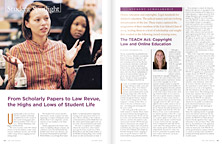Mohamed ElBaradei: Man of Peace
Printer Friendly VersionNew York University Law School alumnus Mohamed ElBaradei (LL.M. ’71, J.S.D. ’74), director general of the International Atomic Energy Agency, was appointed to the post in 1997—a crucial time in the organization’s history.
The IAEA grew out of the “Atoms for Peace” program in the late 1950s and was charged both with the containment of nuclear weaponry and the promotion of peaceful nuclear energy. In many ways its mission is still the same, but the post-cold-war world has presented the agency with a new set of challenges. As an Egyptian national and a strong believer in strict arms control, ElBaradei is uniquely suited to lead the organization as it faces nuclear proliferation among Islamic and Middle Eastern nations and elsewhere.
During the May graduation ceremonies, the University presented ElBaradei with an honorary degree, which joins the master’s degree and doctorate he received at the Law School in the 1970s. ElBaradei’s adviser during his studies was Thomas M. Franck, one of the world’s leading experts in international law. Franck was so impressed by his former student that when he was asked to head the United Nations Institute for Training and Research (UNITAR), he said he would only do so if ElBaradei could be seconded from the Egyptian government to help him.
Born in Cairo in 1942, ElBaradei was already well-versed in the law before he began his studies in the United States. His father, Mostafa ElBaradei, was president of the Egyptian Bar Association, and by 1962 ElBaradei had graduated from the Law Faculty of Cairo University.
He began his career as an international diplomat with the Egyptian Foreign service in 1964, working both in New York and Geneva before enrolling at NYU. On completing his doctorate, he returned to the Egyptian foreign service before Franck asked for him to be appointed as a senior research fellow at the U.N.
ElBaradei joined the International Atomic Energy Agency in 1984. In an interview with an Iranian newspaper, he said of his move that, “I wanted to expand my role from someone who defends the national interests of a small country to one that defends the interests of human beings throughout the world.”
Defending the world is no easy matter. When ElBaradei issued a detailed report in November 2003 outlining Iran’s attempts to deceive weapons inspectors but concluded that there was insufficient evidence to prove the country had plans to develop a nuclear arsenal, he came under attack from the Bush administration and Arab states alike. But ElBaradei has built a reputation as a skilled diplomat who has a steadfast commitment to the principles of law. His dual heritage may at times leave him in a double bind, but an honest arbitrator rarely has a smooth passage.
